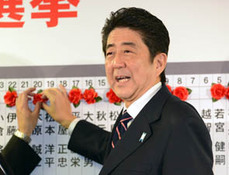 Source: news.ifeng.com
Source: news.ifeng.com The Abe government is wasting no time, with expectations that it will formally be sworn in on Wednesday of next week. As to the speed at which Abe embarks on his pattern of reforms, that is more difficult to predict at this stage, although given the size of the LDP and New Komeito’s victory (325 seats in total) (J) he should have no problem having bills passed through the Lower House. The problem, as far as the LDP are concerned, is the Upper House, in which the DPJ and minority parties still wield considerable influence and which could delay the passage of bills until they return to the Lower House (in which case they will be ratified, as no bill can be rejected by the Upper House twice when the Lower House is dominated by a party or coalition with a 2/3rds majority). Another question having over the result of this election is how is will be perceived internationally, particularly by Japan’s neighbours. Abe has made no secret of his desire for a more forceful, more activist foreign policy founded on a new title for the SDF and the implementation of the right to collective self-defence. He may still exercise discretion on sensitive matters (i.e., Yasukuni Shrine, which he did not formally visit during his previous term as PM, instead reverting to the status of an individual citizen in a nicety which did not placate Chinese concern but which at least did not overtly provoke either China or South Korea), although since Ishihara Shintaro will also be a figure on the floor of the Lower House he may find it difficult to negotiate on territorial issues without being branded weak by his more rightist counterparts.
What will be interesting to see is how Abe of 2013 differs from that of 2007. Abe Shinzo is no intellectual, preferring instead to choose colleagues that will operate in accordance with his wishes but over which he will not exercise tight control. His pedigree and the size of his election victory will be the keys to overcoming any factional opposition to LDP policies, however the LDP’s inability to function in a coherent manner under anything other than a dynamic personality (re: Koizumi Junichiro) should give pause to any expectations of a suddenly revamped, energised LDP. Abe does not have the same charisma as Koizumi, neither does he have the work ethic of either the Reform Party members or other minor party members (being born into a political family tends to do that to a candidate, especially under the old LDP. This is not necessarily true of current generational politicians, re: Koizumi Shinjiro (J).
If, during his time away from the limelight, Abe re-invented his persona and came across as much more “sincere” in his beliefs, then he might exercise greater influence over Japan’s political scene (Abe was virtually MIA for the entire DPJ period in office). But Abe’s press performances, along with his open-air spruiking did nothing to dispel his image as staid and devoid of passion (apart from constitutional revision, the pillar upon which Abe intends to build his political legacy). In electing Abe as PM, the Japanese populace have chosen to revert to a tried-and-tried method, the efficacy of which died in 2007 with the retirement of Koizumi Junichiro.
There are no certainties in democratic politics, and Abe might still emerge as a leader ready to take risks where necessary (de-regulation of domestic markets and removal of tariffs would be a good start), but as the head of a party of conservatives tied to past glories, Abe is indeed "Lazarus with a triple bypass" most likely to pursue retrogressive economic and social policies for want of the courage to battle entrenched interests. For that reason, the manner in which the Reform Party behaves in the Lower House will be interesting to watch, for the future belongs to the minority parties and their ability to influence public opinion over the next few years. That is where the real change from this election lies.
*This post was modified to more accurately reflect parliamentary practices.
 RSS Feed
RSS Feed